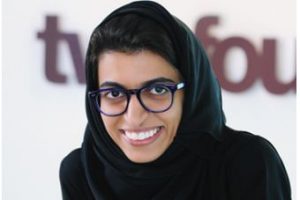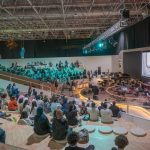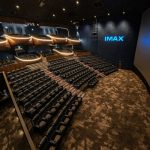Noura Al Kaabi has declared the need for further strategies to address the disconnect between the number of Arabic speaking internet users globally and the percentage of Arabic content online. The twofour54 Chief Executive was speaking in Washington D.C. where she joined Foreign Policy magazine for the release of its annual 100 global thinkers list […]

Noura Al Kaabi has declared the need for further strategies to address the disconnect between the number of Arabic speaking internet users globally and the percentage of Arabic content online. The twofour54 Chief Executive was speaking in Washington D.C. where she joined Foreign Policy magazine for the release of its annual 100 global thinkers list 2013 on which she was named as the first ever Emirati. At the event David Rothkopf, CEO of Foreign Policy said that although Arabic is one of the 10 most important languages in the world, online Arabic content does not exceed 3%.
Nouras dialogue was part of Foreign Policys Transformational Trends seminar entitled: Rethinking the Middle East: Finding Opportunity Amid Unprecedented Upheaval where she participated as a panel member. The event, organized by Foreign Policy magazine in collaboration with the U.S. State Department, was attended by top level decision makers from the United States of America, along with some of the worlds greatest intellectuals.
Moderated by Noah Shachtman, Executive Editor for news at Foreign Policy, the panel also included James Franklin Jeffrey, former senior American diplomat and expert in political, security and energy issues in the Middle East, Turkey, Germany and the Balkans; Anne Patterson, former U.S. Ambassador to Egypt and Vali Nasr, Dean of the Paul H. Nitze School of Advanced International Studies.
During the panel, Noura Al Kaabi stated that the Middle East & North Africa region offers numerous opportunities supported by an existing pool of young talent that is already taking advantage of the digital revolution to develop and enrich Arabic digital content. She added that additional support is required from different entities whether they are public or private and went on to highlight the UAEs successful initiatives, including twofour54, which aims to promote the development of Arabic digital content and encourage users to participate in enriching the Arabic digital content.
Al Kaabi stressed that the growth of Arabic content is an indicator of the increasingly strong profile that Arabic heritage and culture has online globally. She went on to cite that Arabic is one of the fastest growing languages online and has grown by 2500% over the past decade. Despite this positive development, there is still untapped potential as the number of Arabic language internet users reaches only 141 million out of a population of 350 million. Furthermore, Al Kaabi added that the Arabic language is the eighth most used online language worldwide, with English coming in first followed by Chinese, Spanish, Japanese, German, and Portuguese.
Al Kaabi explained that the existing gap is owing to: delayed internet uptake in many Arab countries; a lack of tools; economic and social elements; as well as the fact that Arabs, especially young Arabs, use other languages, limiting the spread of Arabic digital content.
She added that the lack of Arabic digital content impacts our daily lives, particularly as studies suggest that the internet became a source to basic information in all areas, and that young people have come to believe that the internet is one of the most reliable sources of information at the expense of traditional media.
Finally, Noura Al Kaabi extended her gratitude to the UAEs leadership and governmental entities for the work they have done in the area of women empowerment. She gave a special mention of appreciation to H.H. Sheikha Fatima bint Mubarak known as the Mother of the Nation because of her championing of various womens empowerment and development initiatives.
















































































